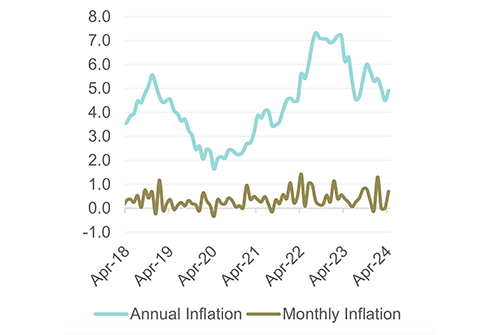Despite projections indicating a deceleration in inflation from an average of 5.9% in 2023 to 4.9% in 2024, stock brokerage Simonis Storm (SS) has stated it is crucial to recognise a recent inflationary reduction does not necessarily imply tangible economic benefits. This is as domestic inflation rates continue to be significantly elevated.
In its latest Inflation report for April 2024, SS notes the inflation outlook remains vulnerable to several risks, notably in the realm of food prices that could easily further escalate due to the impact of the El Niño weather conditions.
Namibia’s annual inflation rate increased in April 2024 to 4.8% year-on-year (y/y) from 4.5% y/y in March 2024, though it was a slowdown from the 6.1% y/y observed in April 2023.
The Namibia Statistics Agency (NSA) noted that primary contributors to the inflationary trend continue to be food, alcohol & tobacco, as well as housing and utilities. On a monthly basis, domestic inflation surged to 0.7% from the stagnant 0% recorded in March 2024.
According to NSA, the core inflation measure, excluding volatile items such as food, non-alcoholic beverages and energy, comprises 75.7% of the total Consumer Price Index (CPI) basket. In April 2024, core inflation stood at 4.3% y/y.
The SS report pointed out that in South Africa, inflation moderated to 5.3% year-on-year (y/y) in March due to a high base effect from the previous year, providing a contrast to Namibia’s inflation dynamics.
According to SS, effects are crucial, as they directly influence the year-on-year calculation of the CPI. A large increase in the previous year tempers the current year’s outcome.
“Turning our view to the global stage, particularly the United States, recent developments in oil markets and US monetary policy play a significant role. Moreover, the Federal Open Market Committee (FOMC) has maintained the Fed funds rate unchanged, citing continued strong economic expansion and employment alongside persistent inflation pressures. The FOMC’s latest meeting underscored the ongoing elevated inflation levels and the lack of progress towards its 2% inflation objective. This broader economic context, including the anticipation of interest rate cuts and their potential impacts, influences market expectations, and can indirectly affect inflationary pressures in Namibia through currency volatility and imported inflation,” the SS report reads.
Meanwhile, domestic inflation during April 2024 increased in all major categories, compared to the previous month. However, SS noted that on an annual basis, a deceleration was noted in all areas of the country, largely due to reduced price pressures in food and non-alcoholic beverages.
Moreover, the Food and Agriculture Organisation Food Price Index for April recorded a modest month-over-month increase of 0.3%, but it remained 9.6% lower than the previous year, reflecting broader trends in global commodity prices.
SS pointed out that the FAO Cereal Price Index halted a three-month decline, with maize prices rising due to increased demand and logistical challenges, although wheat prices remained stable.
Inflationary pressure continues to mount, driven by an increase in fuel prices, which marked a 12.7% change y/y, and diesel 50ppm, which has increased 5.4% y/y. The most recent fuel increase is yet to translate into an anticipated increase in transport inflation that is sure to be exacerbated by an 8% increase in NamPower’s electricity bulk tariff for 2024/25.
“Since electricity charges are included in the calculation of the CPI basket, the tariff adjustment, typically effective in July, is expected to exert further pressure on inflation figures,” SS stated.


